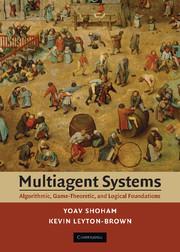Book contents
- Frontmatter
- Contents
- Credits and Acknowledgments
- Introduction
- 1 Distributed Constraint Satisfaction
- 2 Distributed Optimization
- 3 Introduction to Noncooperative Game Theory: Games in Normal Form
- 4 Computing Solution Concepts of Normal-Form Games
- 5 Games with Sequential Actions: Reasoning and Computing with the Extensive Form
- 6 Richer Representations: Beyond the Normal and Extensive Forms
- 7 Learning and Teaching
- 8 Communication
- 9 Aggregating Preferences: Social Choice
- 10 Protocols for Strategic Agents: Mechanism Design
- 11 Protocols for Multiagent Resource Allocation: Auctions
- 12 Teams of Selfish Agents: An Introduction to Coalitional Game Theory
- 13 Logics of Knowledge and Belief
- 14 Beyond Belief: Probability, Dynamics, and Intention
- Appendices: Technical Background
- A Probability Theory
- B Linear and Integer Programming
- C Markov Decision Problems (MDPs)
- D Classical Logic
- Bibliography
- Index
D - Classical Logic
from Appendices: Technical Background
Published online by Cambridge University Press: 05 June 2012
- Frontmatter
- Contents
- Credits and Acknowledgments
- Introduction
- 1 Distributed Constraint Satisfaction
- 2 Distributed Optimization
- 3 Introduction to Noncooperative Game Theory: Games in Normal Form
- 4 Computing Solution Concepts of Normal-Form Games
- 5 Games with Sequential Actions: Reasoning and Computing with the Extensive Form
- 6 Richer Representations: Beyond the Normal and Extensive Forms
- 7 Learning and Teaching
- 8 Communication
- 9 Aggregating Preferences: Social Choice
- 10 Protocols for Strategic Agents: Mechanism Design
- 11 Protocols for Multiagent Resource Allocation: Auctions
- 12 Teams of Selfish Agents: An Introduction to Coalitional Game Theory
- 13 Logics of Knowledge and Belief
- 14 Beyond Belief: Probability, Dynamics, and Intention
- Appendices: Technical Background
- A Probability Theory
- B Linear and Integer Programming
- C Markov Decision Problems (MDPs)
- D Classical Logic
- Bibliography
- Index
Summary
The following is not intended as an introduction to classical logic, but rather as a review of the concepts and a setting of notation. We start with propositional calculus and then move to first-order logic. (We do the latter for completeness, but in fact first-order logic plays almost no role in this book.)
Propositional calculus
Syntax
Given a set P of propositional symbols, the set of sentences in the propositional calculus is the smallest set ℒ containing P such that if φ, ψ ∈ ℒ then also ¬φ ∈ ℒ and ∈ ∧ ψ ℒ. Other connectives such as ∨, →, and ≡ can be defined in terms of ∧ and ¬.
Semantics
A propositional interpretation (or a model) is a set M ⊂ P, the subset of true primitive propositions. The satisfaction relation ⊧ between models and sentences is defined recursively as follows.
For any p ∈ P, M ⊧ p iff p ∈ M.
M ⊧ φ ∧ ψ iff M ⊧ φ and M ⊧ ψ.
M ⊧ ¬φ iff it is not the case that M ⊧ φ.
We overload the ⊧ symbol. First, it is used to denote validity; ⊧ φ means that φ is true in all propositional models. Second, it is used to denote entailment; φ ⊧ ψ means that any model that satisfies φ also satisfies ψ.
Information
- Type
- Chapter
- Information
- Multiagent SystemsAlgorithmic, Game-Theoretic, and Logical Foundations, pp. 457 - 458Publisher: Cambridge University PressPrint publication year: 2008
